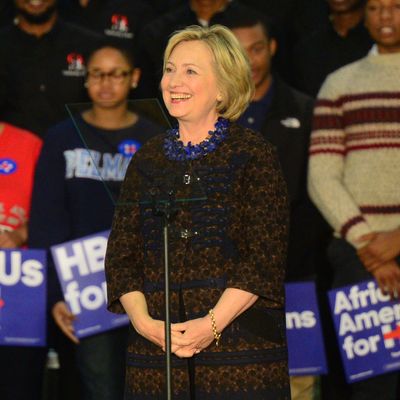
The debate over “swing voter persuasion” and “base mobilization” strategies in political campaigns is an ancient one that will never completely be resolved. I’d say the best campaigns do both. But all campaigns have to make resource decisions that make sense at the moment, in real life and among real voters. And it’s often not a completely binary choice, since swing-voter appeals can make a candidate more competitive and thus “energize the base,” while the same raise-the-stakes negative messaging sometimes needed to turn out the base can also drive swing voters away from the hated opponent into one’s own arms.
It is reasonably clear that Donald Trump is abandoning all but the most negative means of persuading swing voters and making a very big bet on mega-turnout among the kind of people who tend to agree with his dark and reactionary view of America’s condition. He would not have put Stephen Bannon at the top of his campaign hierarchy otherwise.
Conversely, it’s often assumed Hillary Clinton is focusing on swing-voter persuasion given the amount of time she is spending reaching out for and then bragging about crossover support from prominent Republicans. But her campaign is also obviously building on the two Obama campaigns’ success in identifying and mobilizing the young and minority voters often known as the “Obama coalition.” The question is a matter of emphasis and resource allocation. At Vox, Dara Lind channels the views of Democrats who very much want Clinton to shift dollars from TV ads aimed at swing voters into minority-voter-turnout efforts that they believe will do more to turn red states blue than all the Republican conversions you could realistically imagine.
Georgia is the crucial testing ground of this argument, it seems. And a prominent African-American Democratic leader in that increasingly competitive state provides a religious metaphor for the choice:
“We spend a lot of money, and a lot of time, trying to persuade atheists to become Catholics,” says Stacey Abrams, the minority leader of the Georgia House of Representatives. “What we have to do is get Baptists to go to church.”
If Democrats stop pivoting to the center and spending money on ads, and start focusing on getting their natural allies to the polls, they can win more durable victories; America, after all, is only getting more diverse. ‘We’ve already won,’ says Abrams — ‘we just forgot to pick up our prize.’
Such arguments are not entirely new, and are not accepted by everyone. For one thing, “turning” a swing voter who might otherwise vote for one’s opponent harvests a net two votes. For another, base-mobilization strategies that make too much noise run the risk of helping the other party mobilize its own base.
At bottom, of course, a lot of the case for a base-mobilization strategy has less to do with winning elections than with avoiding ideological compromises that will make the governing agenda for the victor less “pure” and far-reaching. To this day, many progressives believe that Obama’s bipartisan talk during his 2008 campaign fatally pre-compromised his administration in exchange for moderate and conservative votes he did not really need.
But on the Democratic side, at least, there is one argument for investing in base mobilization this year that is virtually unanswerable. The recent hyperidentification of the Donkey Party with elements of the electorate that do not proportionately participate in non-presidential elections has contributed to a sudden weakness in midterms, with terrible consequences in 2010 and 2014. Assuming Hillary Clinton wins in this year’s general election, all the indicators (a third-term midterm couldn’t be good for the party holding the White House so long, a problem exacerbated by a horrific Senate landscape) suggest that Democrats would likely face long odds in 2018 as well. It’s urgently important that Democrats do something about non-presidential-base turnout. This year is as good a time as any, and better than most, to invest some major money in solving the puzzle. If Stacey Abrams is right, and it also happens to give Hillary Clinton 16 electorate votes in Georgia, that’s quite a bonus.






























